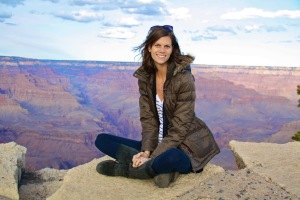Good Days and Bad Days
February 19, 2012
Lisa Jackson
Lifestyle
We have good days and bad days here. This past weekend, spending time at the magical and majestic Grand Canyon were Great days. On the way home, Dana told Doug, “I don’t even feel like I have cancer”.
This weekend, as Ben Harper would say, “I was blessed to be a witness”!
The last two days have not been good days. Dana tried a new therapy, one that is supposed to be a more effective Hyper Oxygen routine that takes less time sitting and using less blood, but a therapy that had an immediate effect on Dana. Within seconds of having her own treated blood re-infused in her, she experienced blurred peripheral vision out of one eye, a complaint that her right arm was heavy and a pressure and aura similar to a migraine as well as lightheadedness. Believe me, when Dana complains of being “lightheaded”, pay attention as she has a tendency to go down (see blog 1). She received an extra IV bag of normal saline and then another new therapy called PEMF for her head as well as over her tumors. We came home and she ate a voracious salad with everything in it and some special broth I concocted with Medi-Aminos (all her amino acids), Himalayas sea salt and spirulina, chlorella and sea vegetables. Warm, nutritious and yes, even palatable! She seemed to feel better until after American Idol when we went to bed and she felt progressively worse, feverish, cold and achy. I received a text at 4am saying she had been up all night and didn’t think she could make the 8am yoga class.
I knew she was really sick when she wanted to forgo the 10am myofascial therapy and go back to sleep. The doctors of course wanted to see her, take more blood and evaluate her. Oddly enough, they were excited with her low-grade fever and symptoms. We are told that those who react this way usually make great progress with cancer regression as this is sign of the body’s own immune system kicking in. Still, I cannot emphasize how hard it is to see Dana so weak and frail during these acute incidences. It is once again an exercise in faith and prayer that we are on the right path. Yes, and healthy questioning every day.
I just finished reading a book that a fellow caregiver lent me here called Counter Clockwise by Ellen J. Langer that was thought provoking and so relevant to the process we are going through. Ellen has won a Guggenheim Fellowship Award for Distinguished Contributions to Psychology in the Public Interest from the American Psychological Association and the author of Mindfulness, which is on my next “must read” list. Her research has shown time and again how we can be influenced both positively and negatively by our own limiting mindsets, by what our culture mores dictate and the power we give over to “experts” such as our physicians. This effects how we age as well as how we heal.
As a retired nurse who witnessed the loss of two loved ones to lymphoma and Hodgkin’s Disease undergoing conventional medicine, my mode is to question everything and everyone. It is no different here and now and especially so as we take, The Road Less Traveled. All of us naturally want to believe that our Doctor has all of the answers. As Ellen says, “ The impulse to surrender our future treatment wholly to the professional hands of medical practitioners is understandable. Leaving the doctors to make all the choices relieves the existential fear of being responsible for a decision that could in the end hurt us. But not to be involved may hurt us more.”
What is being reinforced here is the power of the individual in the healing process. The days that I am being the Momma Bear and the extreme nag are the days that I am taking away Dana’s self responsibility. She has correctly written that at 28 she should not be living with her mother. I admit that I am powerless over her disease and her recovery and that is a very difficult realization for me to accept. Part of Dana’s recovery here is to actively learn about all of the treatments but more importantly to look at possible causes & stressors so that the she can prevent a reoccurrence. There are many methods to get rid of the cancer, some more lethal than others. Truly healing from within addresses emotional, psychological, social and physical healing. We are not only what we eat, we are what we breathe, and most importantly what we think. Just as we can fill ourselves with junk food, we can fill up on mindless entertainment and go through life mindlessly reacting to others expectations. Or we can live a life with intention and fill ourselves with mindful, spiritual and positive thoughts. Studies have shown that Optimists have better prognoses. We can journal, meditate and get in touch with our inner selves and our higher power. What Dana reads, watches, thinks and believes is vitallyimportant.
Ellen Langer also writes, “ By recognizing the limits to what the physician can know, we can become more confident in the importance of sharing that information. We act as health learners, fully engaged in our health and better able to work with the experts. We become the expert on our individual health and the doctors become the consultants.”
“If we are our own expert, we might consider using several consultants….to get different views…. that signal to us that we are in charge. When we understand the limits of medical data, we can accept that receiving the same view from multiple people does not necessarily mean that they are correct. It may only mean that the physicians were trained similarly. We don’t become stressed when views differ; we become more aware of how important our own role is to the process. To help us make decisions, we take a more active role not only in considering the information we receive but also in bringing information to the discussion.
“We shouldn’t wait to be asked questions that our doctor believes are important to help with the diagnosis; doctors’ questions are based on normative data, on what is true for most people. If we were the experts, we would offer information that we feel correlates with how we are feeling. Instead of asking, “Is this related to that?” we would ask “How might this be related to that?” Doing so encourages a different sort of information search, one that leads our consultants to consider one particular case instead of the general one.”
We are all individuals and need to recognize the limits of man-made “statistics”.
My favorite part of my role here is watching my daughter empower herself as she takes control of her health and wellness with the grace and spirit that is her signature.
Carpe Diem




